Internal quality assurance in the area of studies and teaching at Leibniz University Hannover is carried out following successful system accreditation as part of the Leibniz Quality in Teaching Programme (LQL Programme).
The LQL Programme is based on a multi-stage concept that further develops various components of the existing internal quality assurance system in the area of monitoring and evaluation and adds a third level of quality assurance in the form of the LQL Review, which replaces the previous programme accreditation.
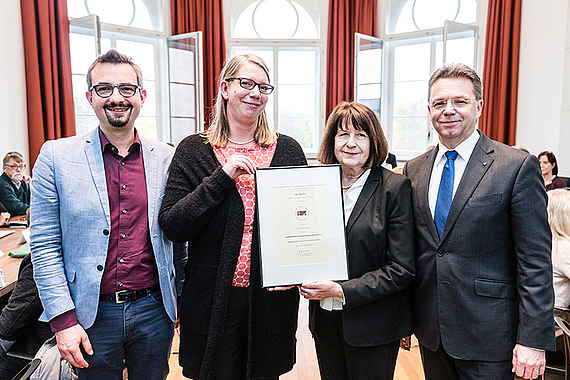
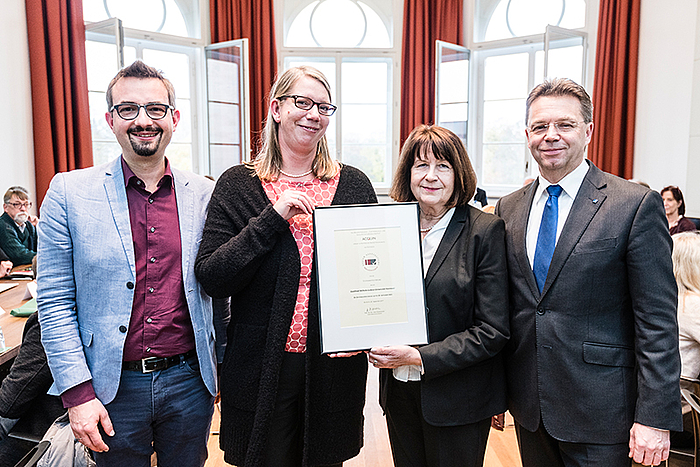
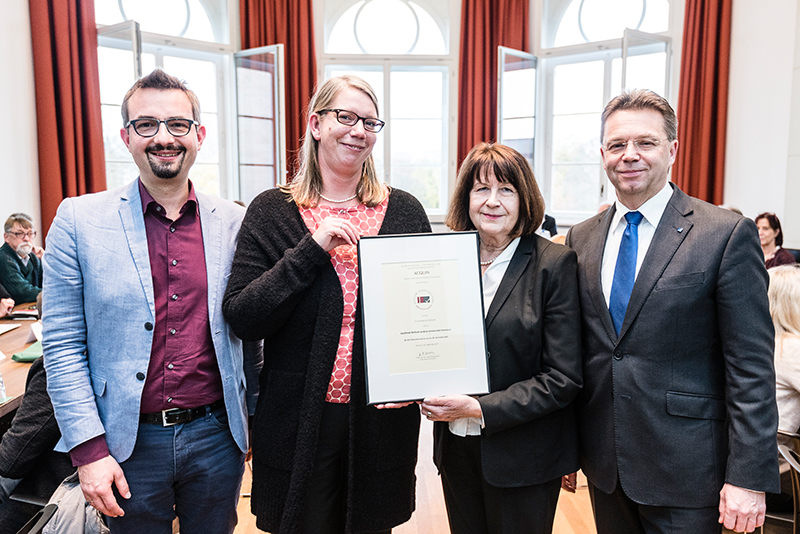 ©
Moritz Küstner / LUH
©
Moritz Küstner / LUH
Key components of internal quality assurance
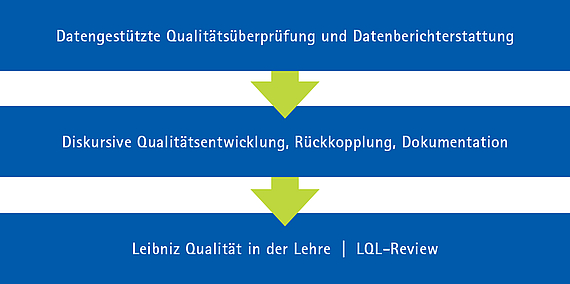
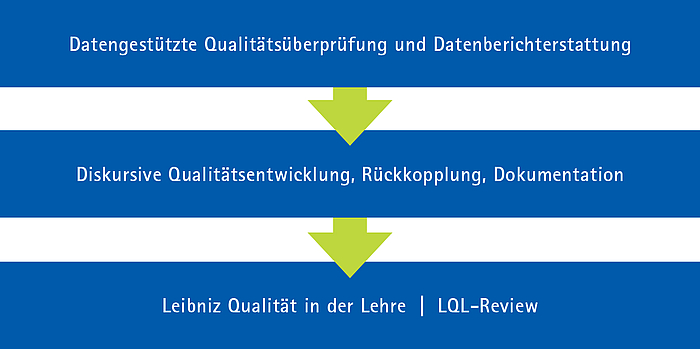
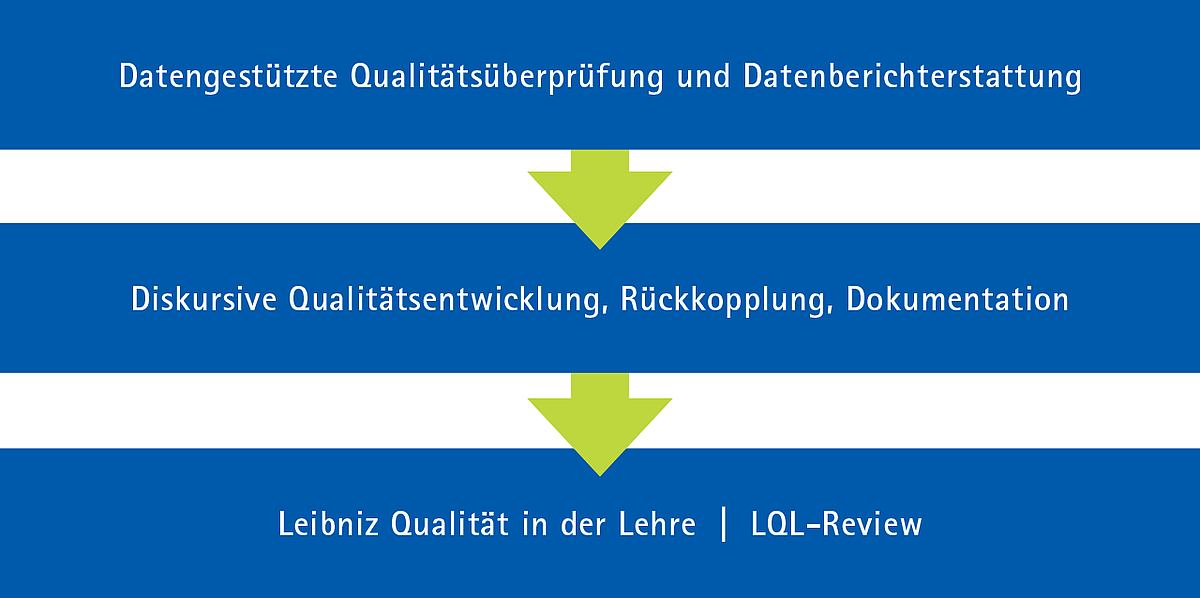
Data-supported quality review
Leibniz University Hannover uses a range of different data-supported instruments and measures in the area of evaluation and monitoring to gain insights into the quality of studies and teaching and to identify areas for further development.
In line with the strategic quality objectives based on the academic cycle, the various instruments cover the entire student life cycle, with the specific requirements and problems of each phase of study.
The instruments in the area of monitoring and evaluation include in particular:
The data obtained from these instruments is incorporated into the discursive quality development processes and is also reviewed as part of the LQL Review, which is carried out every six years for existing degree programmes.
Discursive quality development and feedback
The quality strategy of Leibniz University Hannover is based on a discursive, communicative approach involving various stakeholders. Results from quality assurance and development procedures are incorporated into consultation processes: centrally, decentrally and in exchange between the levels. Students are closely involved in these consultations.
The places where the quality of studies and teaching is discussed and reported on currently include:
-
Study commissions and QM circles with a student majority
The results of the QM instruments are discussed and appropriate measures for further quality development in the degree programmes are derived primarily at the decentralised level. Study commissions and QM circles play an important role in this process.
According to the NHG, study commissions with a student majority must be formed. They are chaired by the dean of studies, who has no voting rights. The study commissions advise the faculties on matters relating to teaching, studies and examinations.
With the transition to system accreditation, QM circles were established in the faculties and teaching units by resolution of the faculty councils. Depending on the structure of the faculties, QM circles may be responsible for one or more degree programmes. At least 50% of the members belong to the student group. The task of the QM circles is to advise the deans of studies on all matters relating to quality assurance of degree programmes at a decentralised level. The advice provided by the QM circles is taken into account by the deans of studies when preparing their annual reports on the quality of studies and teaching in the degree programmes, which deal, among other things, with the results of the continuous quality assurance instruments. As a rule, the tasks of the QM circles are transferred to the study commissions.
-
Quality discussions between the VPL and the faculties
At least once a year, a quality discussion takes place between the Vice President for Education and the individual deans, focusing on issues relating to the quality of studies and teaching.
Direct discussions between individual study commissions / QM circles and the VPL take place as required or on request.
-
Round table of the deans of studies
The deans of studies regularly exchange information on central or decentralised topics relating to quality assurance and development in studies and teaching and coordinate joint processes and measures.
The meeting of the deans of studies is chaired by the VPL.
-
Teaching and Studies Working Group
The working group consists of representatives of the study deans' offices and of administrative units and central institutions that are significantly involved in studies and teaching. Its task is to advise on and deal with issues relating to studies and teaching. This often takes place in preparation for or follow-up to the meeting of the study deans. For specific topics, small groups can be formed within the working group and experts can be called in as required.
The working group is chaired by the VPL.
-
Extended meetings of the Presidium with all deans
Every two months, the Presidium meets with all deans in the form of an extended Presidium meeting.
-
Topic-related working groups
Individual aspects of quality development are monitored on an ongoing or ad hoc basis in topic-related working groups:
Quality Assurance Working Group
The working group is responsible for coordinating the various procedures and instruments in the LQL Programme. Its main focus is on central surveys, programme reviews and system accreditation. If necessary, it advises the Senate on these topics. The working group consists of representatives from the dean's offices. Depending on the topic, representatives from the administration and central institutions involved in studies and teaching are also invited to the meetings. The ZQS/Quality Assurance is responsible for this working group.Course Evaluation Working Group
The working group advises on overarching issues relating to the development and implementation of course evaluation. It contributes to the further development of course evaluation procedures and instruments and ensures an exchange of information between the faculties and with the ZQS/Quality Assurance. The working group is composed of the evaluation coordinators of the faculties and is supported by the ZQS/elsa (E-Learning Service Department of the ZQS) on technical issues. The ZQS/Quality Assurance is responsible for this working group.Working Group on Recognition
The working group advises on overarching issues relating to the recognition of academic achievements and examinations from Germany and abroad. It acts as a forum for the exchange of information on specific problems relating to recognition and for the further development of university-wide guidelines. Its members are central and decentralised persons responsible for recognition / credit transfer. The ZQS/Quality Assurance is responsible for this working group. -
Report
The deans of studies or the director of studies and teaching prepare regular reports, usually annually, on quality assurance and development in studies and teaching at their faculty or the Leibniz School of Education. These annual reports show how the quality management system works at faculty level. The ZQS/Quality Assurance reports once a year to the Senate and the public on quality assurance and development in studies and teaching within the framework of the LQL Programme.





